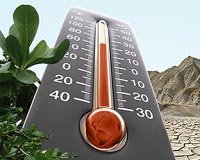 |
Copenhagen (AFP) Dec 19, 2009 A UN climate summit Saturday rammed through a battle plan against global warming forged by US President Barack Obama and other top leaders, sidelining smaller states which lashed the deal as betrayal. After toxic exchanges, the conference chair forced through a deal using an unusual procedural tool that effectively dropped all obstacles to the new-born Copenhagen Accord. UN chief General Ban Ki-moon admitted the agreement had failed to win global consensus and would disappoint many who demanded stronger action against climate change but voiced relief it had not been strangled at birth. "Many will say that it lacks ambition," Ban said. "Nonetheless, you have achieved much." Obama earlier called the political accord an "unprecedented breakthrough" after meetings with about two dozen presidents and prime ministers in Copenhagen. The agreement was assembled in a frenzied game of climate poker among the leaders of the United States, China, India, Brazil and South Africa and major European countries. The group had been chosen by conference chair Denmark after it became clear the summit was in danger of catastrophic failure. But the deal was savaged when it was put to a full session of the 194-nation UN Framework Convention on Climate Change (UNFCCC). Half a dozen developing countries led the charge, blasting the document as a cosy backdoor deal that violated UN democracy, excluded the poor and doomed the world to disastrous climate change. "It looks like we are being offered 30 pieces of silver to betray our people and our future," said Ian Fry of Tuvalu, a tiny Pacific island whose very existence is threatened by rising seas. The draft is intended to be the kernel of a strategy to slash the fossil-fuel emissions that trap the Sun's heat and are warming Earth's surface, slowly but ruthlessly damaging our weather systems. It set a commitment to limit global warming to two degrees Celsius (3.6 Fahrenheit), but did not spell out the important stepping stones -- global emissions targets for 2020 or 2050 -- for getting there. It did not identify a year by which emissions should peak, a demand made by rich countries that was fiercely opposed by China. And, under it, pledges are voluntary and free from tough compliance provisions to ensure they are honoured. China had bristled at anything called "verification" of its plan to cut the intensity of its carbon emissions, seeing it as an infringement of sovereignty and saying rich nations bore primary responsibility for global warming. The deal was more detailed on how poor countries should be financially aided to shore up their defences against rising seas, droughts, floods and storms. Rich countries pledged 30 billion dollars in "fast-track" finance for the 2010-2012 period, including 11 billion from Japan, 10.6 billion from the European Union and 3.6 billion dollars from the United States. They set an ambitious goal of "jointly mobilising" 100 billion dollars by 2020. But to make the "fast-track" funds operational, the accord needed plenary approval. Countries were invited to sign up to the deal. More than 130 leaders attended the outcome, "the biggest meeting of heads of state and government in the history of the United Nations and possibly in history," said UNFCCC Information Officer John Hay. The goal is to complete a signable treaty in Mexico City in December 2010 and have it take effect from 2013, after the current roster of pledges under the UN's Kyoto Protocol expire. The outcome in Copenhagen will deliver a boost to Obama's efforts to secure legislation in the US Congress that would set his country on a path to lower emissions by around 17 percent by 2020 over a 2005 benchmark. He described the deal as a "meaningful and unprecedented breakthrough." The Copenhagen Accord was met with dismay by campaigners, who said it was weak, non-binding and sold out the poor. "Well-meant but half-hearted pledges to protect our planet from dangerous climate change are simply not sufficient to address a crisis that calls for completely new ways of collaboration across rich and poor countries," said Kim Carstensen, leader of WWF's Global Climate Initiative. Climate scientists also warned that the deal fell perilously short of what is needed to stave off catastrophe. "From the evidence of the last two weeks, I would say we have a heck of a long way still to go if, as a species, we are to avoid the fate that usually afflicts populations that outgrow their resources," said Andrew Watson, a professor at the University of East Anglia in Britain. Share This Article With Planet Earth
Related Links Climate Science News - Modeling, Mitigation Adaptation
 Fury erupts at UN climate talks
Fury erupts at UN climate talksCopenhagen (AFP) Dec 19, 2009 Fury erupted at the Copenhagen climate talks Saturday over a draft accord agreed by a select group of leaders, with several poor nations saying it amounted to a coup against the United Nations. "You are going to endorse this coup d'etat against the United Nations," Venezuela's representative Claudia Salerno Caldera told Danish Prime Minister Lars Loekke Rasmussen, the conference's chairman, in a speech from the floor. "Those of us who wish to speak have to make a point of order by cutting our hands and drawing blood," she added, before opening a red-stained palm. ... read more |
|
| The content herein, unless otherwise known to be public domain, are Copyright 1995-2009 - SpaceDaily. AFP and UPI Wire Stories are copyright Agence France-Presse and United Press International. ESA Portal Reports are copyright European Space Agency. All NASA sourced material is public domain. Additional copyrights may apply in whole or part to other bona fide parties. Advertising does not imply endorsement,agreement or approval of any opinions, statements or information provided by SpaceDaily on any Web page published or hosted by SpaceDaily. Privacy Statement |